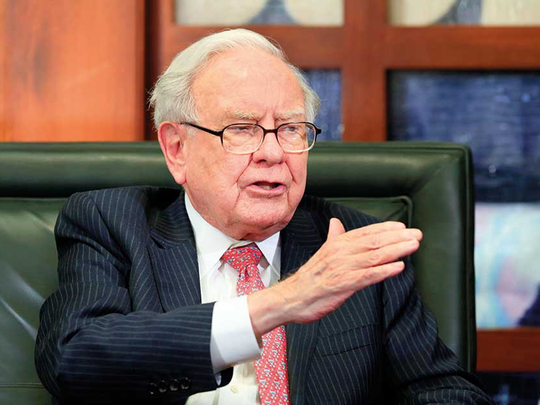
New York
Warren Buffett is betting that some types of brick-and-mortar real estate will hold up better than others in the age of Amazon.
His Berkshire Hathaway Inc. took a 9.8 per cent stake in Store Capital Corp., sending shares of the real estate investment trust surging on June 26. Unlike other retail landlords that have come under pressure as consumers shop more online, Store focuses on service properties: pre-school facilities, health clubs, dine-in movie theatres and pet-care sites.
Less than a fifth of its portfolio is invested in traditional retail — and even those it calls “internet resistant”, including furniture stores, hobby and craft centers, and hunting, fishing and camping shops. “Store doesn’t compete on the beaten path,” said Haendel St. Juste, an analyst at Mizuho Securities USA Inc. “They are targeting more experiential retail, trying to provide a buffer against risk.”
Retail REITs have taken a beating from investors as Amazon.com Inc. and other online sellers make it easier for consumers to buy clothing, toys and other items from their computers or smartphones and not have to step foot into a physical store. Buffett has long expressed confidence in property investments to generate income for extended periods of time, and to provide a cushion should the dollar lose value. He has said such bets, whether in buildings or agricultural land, are often safer than gold or bonds.
“Ideally, these assets should have the ability in inflationary times to deliver output that will retain its purchasing-power value while requiring a minimum of new capital investment,” Buffett wrote in a letter to shareholders in 2012. Farms, real estate and businesses such as Coca-Cola Co. “meet that double-barrelled test”.
As an owner of single-tenant buildings, Store manages its properties differently than many retail landlords. Tenants cover the costs of operating the real estate, including taxes, maintenance and insurance. Store essentially acts as a finance company for middle-market tenants without access to affordable capital, St. Juste said.
“They get mom-and-pops’ capital on much better terms by monetising their real estate,” he said.
Store Capital issued 18.6 million shares to Buffett’s company in a private placement at $20.25 (Dh74.38) apiece, the REIT said. The $377 million investment by Berkshire follows a deal last week in which it agreed to prop up Canada’s Home Capital Group Inc. by providing a credit line and committing to take an equity stake.
Store Capital CEO Christopher Volk said that Berkshire had been studying the REIT since 2014, occasionally holding conversations with management. Two weeks ago, Buffett’s deputy investment manager Ted Weschler called the company to suggest a deal because the price had fallen to an attractive level, Volk said.
“Berkshire Hathaway is fundamentally a value-oriented investor,” he said. “The trading price had dropped because there was a fear that we had a lot of retail exposure, which we actually don’t. We’re predominantly focused on the service sector.”
Buffett has other bets on commercial real estate. Berkshire and Leucadia National Corp. are joint owners of Berkadia Commercial Mortgage LLC, a provider of banking and sales services to the property industry.
The billionaire has also personally invested in REITs. After Sears Holdings Corp. spun off some of its properties into an entity called Seritage Growth Properties, he took an 8 per cent stake in the trust. The deal followed an investment, in 2000, in Aegis Realty Inc., which at the time owned shopping centers and other properties in 15 US states.
— Bloomberg












